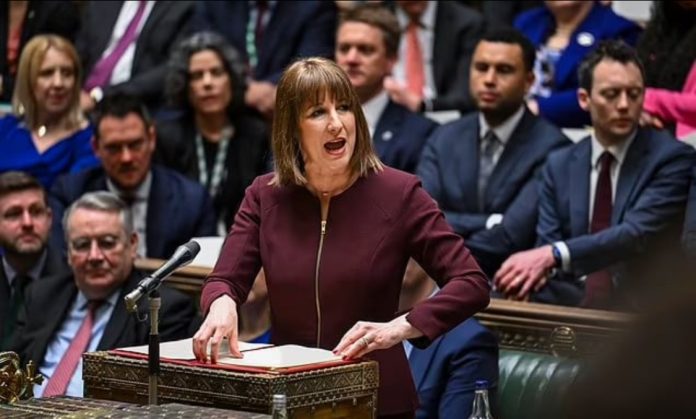By Avanti Populo
In a classic guns not butter statement, Britain’s Chancellor, Rachel Reeves, hammered the poor in order to enrich the arms industry. To add to the £2.9 billion already earmarked for the military budget next year, Reeves found a further £2.2 billion, a grand total of £5.1 billion extra next year alone, with the promise of more to come.
In order to build this additional military capacity to defend against a mythical Russian threat, Reeves not only hammered the poor in Britain with welfare cuts but also cut the overseas aid budget further, just to ensure that the pain was spread at an international level.
Reeves claims to have cut welfare in Britain by £4.8 billion, but the Resolution Foundation think tank calculates that about 800,000 claimants will have reduced personal independence payments, saving the government £8.1 billion by 2029-30. It is estimated that this will affect 3 million families.
While Reeves pins her hopes on economic growth and getting people into jobs to offset the slashing of welfare, the Office for Budget Responsibility (OBR) halved Britain’s economic growth forecast for next year from 2% to 1%, which hardly suggests a boom in employment of any kind, let alone one which could compensate for the ripping away of the welfare safety net for many.
A recent economic analysis by the Joseph Rowntree Foundation projects that living standards for families in Britain will be worse in 2030 than in 2025, with those on the lowest incomes declining twice as fast as middle and high earners. The report indicates that the poorest third are being disproportionately affected by rising housing costs, falling real earnings and frozen tax thresholds. Increased military spending, along with the other measures in the Spring statement, will further exacerbate this trend.
Even the Treasury’s own impact assessment estimates that 250,000 more people, including 50,000 children, will be left in relative poverty after housing costs by the end of the decade as a result of the government’s squeeze on welfare.
Just to add to the wider uncertainty about the economy, US President Donald Trump this week announced a 25% levy on car imports to the US, with the possibility of further measures to come. The danger of being sucked into a trade war, due to the actions of Trump, will further undermine the notion that Britain has a ‘special relationship’ that will allow it to be excluded from Trump’s wider tariff war.
However, speaking on Sky News, Reeves was firmly wedded to her deluded projections, saying:
“I am absolutely certain that our reforms, instead of pushing people into poverty, are going to get people into work. And we know that if you move from welfare into work, you are much less likely to be in poverty.”
Given the nature of capitalism, as an exploitative system dominated by private sector companies whose main objective is to increase profit, not wages, Reeves vision is at best utopian and at worst simply an attempt to mislead and dissemble her way out of the fact that the cuts proposed are not out of necessity but are from political choice.
Of course, Reeves is not a one-woman band. She has the full backing of Labour leader Kier Starmer, the Cabinet and a majority of Labour MPs, so responsibility runs deep within the Parliamentary Labour Party, even though approval for the actions of Labour’s leadership is not shared by many trade union affiliates or local party activists.
Unite leader Sharon Graham condemned Reeves for rigidly sticking to her self imposed financial rules with the evidence of ruin in working-class communities all around, stating:
“Rachel Reeves is right; the world has changed, but why is it always everyday people that have to pay the price? They paid the price after the 2008 crash and the Covid pandemic and are now expected to pay the price again. It is simply wrong.”
Unfortunately, Graham is unable to make the link between attacks on working-class communities and the increase in military spending, going on to congratulate the government for pledging to “invest in our defence in an uncertain global world”.
GMB General Secretary, Gary Smith, was more succinct, stating:
“Tackling huge economic problems is a historic challenge. That’s why we need proper investment in key industries – and must nationalise them if necessary.”
TUC General Secretary Paul Novak took issue with the Office for Budget Responsibility (OBR), stating:
“It is time to review both the role of the OBR and how it models the long-term impacts of public investment. Short-term changes in forecasts should not be driving long-term government decision-making.”
Posting on X, former Labour leader and Independent MP Jeremy Corbyn was absolutely clear:
“This Labour government could have taxed the wealthiest in our society. It is disgraceful that they are choosing to go after the poor and disabled instead.”
Unity around the concepts of jobs, not bombs; welfare, not warfare; and organising society in the interests of the many, not the few, are key to moving towards lasting socialist change. There is clearly still work to be done across the Labour movement and within working-class communities to build support which recognises that these issues are linked and the common denominator is capitalism.
Ongoing mass extra-parliamentary action will play a key role in building that support and that political understanding, vital in the progress towards a socialist future.
https://avantipopulo.co.uk/…/spring-statement-for-the…







